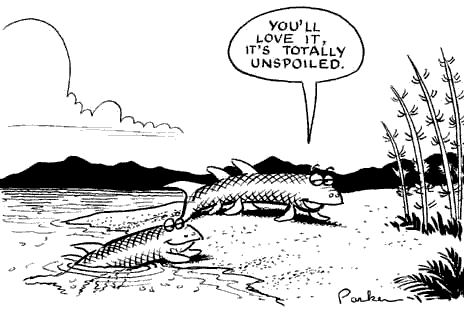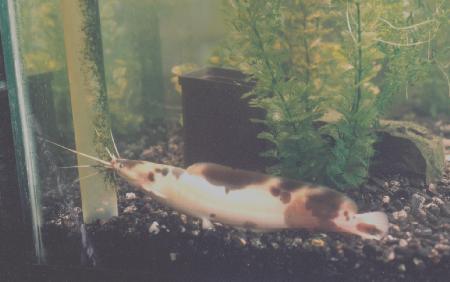
Charley Parker
There are so many living things - so many ways of living! And, some of them illustrate better than any textbook the long route that life took from molecule to mammal. One of these is the genus Clarias, the 'Walking Catfish'.
They are true fish. But, they breath air!
Their air breathing organ is in their brachial cavity, just like our lungs are. It contains so much air that they often swim as though they were tail-heavy. Their gills have atrophied so much that they suffocate where water freezes over and air is unobtainable. However, they regularly "walk" on land to move from one water body to another. You've seen those drawings of primitive sea creatures crawling up onto lifeless land - this drawing is alive!
One species, Clarias batrachus, is occasionally found in tropical fish stores. It has a body shaped like a fish, scaleless like an amphibian, and four pairs of barbells. It comes in a wide variety of colours: white, tan, gray, brown, or albino. Males have spots on their dorsal fin and females don't. It moves on land by curling its tail forward then jumping, like a frog with only one rear leg, keeping itself upright with its stiff front fins. Mine could move so fast it almost got away from me a few times, even with a large butterfly net in hand.
Clarias are not appreciated by fastidious aquarists, for they dismember and eat any fish smaller than they are. It's not a quick process either. Clarias have a small mouth, with no teeth - their prey has to be reduced to swallowing size by shaking. They normally live on muddy bottoms, and can't see more than a few centimetres, so they have to locate food almost entirely by smell and motion. And, in the artificial environment of a small aquarium, smells can spread so evenly that even that fails to help them locate food - they have to just charge around until they run into it. I fed mine dried food (koi pellets), and earwigs in season.

They are also a useful example of the resilience of biodiverse ecosystems. The June 1969 National Geographic (135:846-851) contains photos of the panic-driven campaign that occurred when they were discovered in the Everglades. The living things of thousands of pools were killed with rotenone until it was discovered that everything except the catfish were being killed - they simply climbed out of the poisoned pools and walked to the next one. The campaign was abandoned - the Everglades given up as lost forever by the authorities. Then, it was discovered that alligators love Clarias - the alligators of the Everglades have never been better fed! I am not aware of a single species whose existence in the Everglades was endangered by the addition of Clarias. (Incidentally, the same is true of house sparrows, starlings and purple loosestrife, all of which have engendered equally panic-stricken campaigns around me in Canada.)
As do all experienced aquarists, I underfed rather than overfed for best health. However, when Clarias feel underfed, they try to head for the next pond, by thumping and pushing on the aquarium cover. Once out of the aquarium, they will roam a building in search of an exit until they are almost totally desiccated. (Or, meet a household cat or dog - they are helpless to defend themselves on land.) Mine reached 40 cm long, and was one strong fish - I had a weight on the cover!
Despite being an air breather, they need a large aquarium due to their size - 150 litres or more. The pH should be slightly acidic, 6.5-7.0, and water temperature 15-25C, for best health. They are very hardy, do not need a heater in a centrally heated building, and eat anything usually offered to fish. They can eat until their belly swells to the size of a golf ball, then do without food for the next week - no fish sitter needed.
Mine is now gone - after 15 years he died of a tumour. He'll be long remembered, as one fascinating fish.